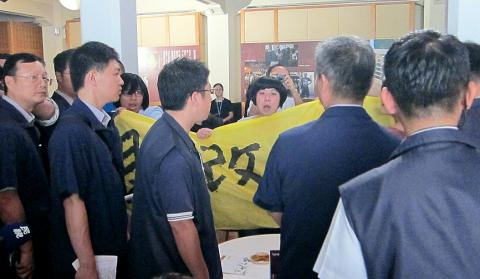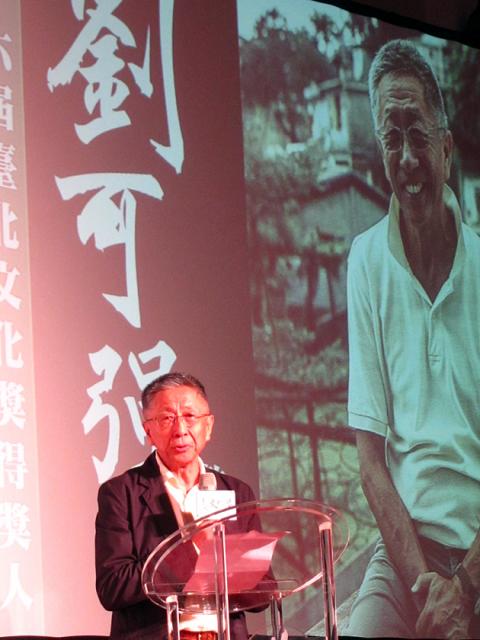Small-scale protests against the Taipei City Government’s handling of urban renewal projects marred the award ceremony of the Taipei Culture Award yesterday, with protesters urging the city government to pay more attention to housing justice in dealing with controversial cases such as the preservation of the Losheng Sanatorium and the urban renewal project in Shihlin District (士林).
Taipei City’s Department of Cultural Affairs yesterday presented the Taipei Culture Award to urban planning activist John Liu (劉可強) and film director Doze Niu (鈕承澤) for their contributions to the preservation of Taipei’s traditions and promotion of the city’s culture through innovative measures.
Liu, an urban planning professor at National Taiwan University, is the mastermind behind reconstruction projects for some of the city’s historical buildings and sites, including Treasure Hill Village (寶藏巖) and Wistaria House (紫藤廬). He also leads an urban design foundation and takes part in various urban reform projects that include the controversial Losheng Sanatorium case.

Photo: Lin Hsiang-mei, Taipei Times
The other recipient, Niu, is a well-known actor and director in Taiwan who gained fame with his two box office hits: Monga (艋舺) and Love (愛).
Describing Liu and Niu as “practitioners of cultural movements in Taipei,” Taipei Mayor Hau Lung-bin (郝龍斌) praised Liu for transforming Taipei’s landscape through urban reform, while lauding Niu for documenting the city’s charm and raising its international profile with his popular movies.
However, the award ceremony was interrupted several times by protesters, with various activists of the Losheng Sanatorium preservation movement waving banners and shouting “Save Losheng Sanatorium” and “Don’t be a culture murderer” while Hau gave his speech in the reception at Taipei Zhongshan Hall.

Photo: Lin Hsiang-mei, Taipei Times
“The Control Yuan’s investigation has confirmed that the sanatorium site is not a suitable site on which to build an MRT maintenance depot. As Mayor Hau said, it is crucial to preserve a city’s history and culture, and so we come here today to urge him to save the historical Losheng Sanatiroum,” said one of the protesters, surnamed Wu (巫), after police escorted the activists from the ceremony.
Losheng Sanatorium was completed in the 1930s on a hill in Sinjhuang District (新莊), New Taipei City (新北市), to isolate people with leprosy, since it was believed to be a contagious and incurable disease at the time.
Before the ceremony began, three advocates for the stalled urban renewal project in Shihlin District, known as Wenlin Yuan (文林苑) project, also launched a small protest outside the ceremony, shouting “save Wenlin Yuan” as Hau entered the building.
The urban renewal project is stalled due to opposition from the Wang (王) family, whose houses were torn down by the city government this year to facilitate the approved project. The family and their supporters have been occupying the construction site and refuse to leave.
Even the band Kao Chiu Ching (拷秋勤), who were invited to perform at the ceremony independent of the protests, called on the city government during their performance “not to sacrifice housing justice over any urban renewal project.”
Liu, in his award acceptance speech, also urged the city government to address the controversial urban renewal projects.
“The city government must take a stance on urban renewal and exercise its authority to resolve the disputes while bearing social justice in mind ... I want to encourage Mayor Hau to take a more positive, active role in handling the issues,” he said.
Meawhile, Democratic Progressive Party Taipei City Councilor Tung Chung-yen (童仲彥) yesterday challenged the city government’s decision to honor Niu for what he described a stereotypical portrait of the old Wanhua District (萬華) in his film Monga, a movie about a group of gangsters from the area.
Department commissioner Liu Wei-kun (劉維公) dismissed Tung’s criticism and said Niu was awarded for his innovation in promoting Taipei and representing life in Taipei, and said the award was not given to him based solely on Monga.

Taiwanese can file complaints with the Tourism Administration to report travel agencies if their activities caused termination of a person’s citizenship, Mainland Affairs Council Minister Chiu Chui-cheng (邱垂正) said yesterday, after a podcaster highlighted a case in which a person’s citizenship was canceled for receiving a single-use Chinese passport to enter Russia. The council is aware of incidents in which people who signed up through Chinese travel agencies for tours of Russia were told they could obtain Russian visas and fast-track border clearance, Chiu told reporters on the sidelines of an event in Taipei. However, the travel agencies actually applied

Japanese footwear brand Onitsuka Tiger today issued a public apology and said it has suspended an employee amid allegations that the staff member discriminated against a Vietnamese customer at its Taipei 101 store. Posting on the social media platform Threads yesterday, a user said that an employee at the store said that “those shoes are very expensive” when her friend, who is a migrant worker from Vietnam, asked for assistance. The employee then ignored her until she asked again, to which she replied: "We don't have a size 37." The post had amassed nearly 26,000 likes and 916 comments as of this

New measures aimed at making Taiwan more attractive to foreign professionals came into effect this month, the National Development Council said yesterday. Among the changes, international students at Taiwanese universities would be able to work in Taiwan without a work permit in the two years after they graduate, explainer materials provided by the council said. In addition, foreign nationals who graduated from one of the world’s top 200 universities within the past five years can also apply for a two-year open work permit. Previously, those graduates would have needed to apply for a work permit using point-based criteria or have a Taiwanese company

The Shilin District Prosecutors’ Office yesterday indicted two Taiwanese and issued a wanted notice for Pete Liu (劉作虎), founder of Shenzhen-based smartphone manufacturer OnePlus Technology Co (萬普拉斯科技), for allegedly contravening the Act Governing Relations Between the People of the Taiwan Area and the Mainland Area (臺灣地區與大陸地區人民關係條例) by poaching 70 engineers in Taiwan. Liu allegedly traveled to Taiwan at the end of 2014 and met with a Taiwanese man surnamed Lin (林) to discuss establishing a mobile software research and development (R&D) team in Taiwan, prosecutors said. Without approval from the government, Lin, following Liu’s instructions, recruited more than 70 software